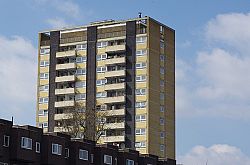

The United Nations has warned the UK Government that failure to remove flammable cladding panels on high-rise buildings may be a breach of international law.
The UN's special rapporteur on adequate housing, Leilani Farha, wrote to the Government with "serious concern about allegations of multiple violations of the human right to adequate housing, of which safety is a key component - contrary to the international human rights law."
Three years after the Grenfell Tower fire disaster, there are still 300 high-rise buildings in England which are covered with similar unsafe aluminium composite cladding that lead to the rapid spread of fire on the outside of the building.
The UN argues that the UK breached an international covenant on economic, social and cultural rights, which gives the "right of everyone to an adequate standard of living ... including housing ... with adequate space and protecting them from cold, damp, heat, rain, wind or other threats to health", which includes protection from fire. This covenant was ratified by the UK in 1976, and the country must show that "every effort has been made to use a maximum of available resources on an effort to discharge obligations".
Currently, MPs are launching an investigation into why the Government has spent less than a quarter of a £600 million fund to replace dangerous cladding on high-rise buildings. Currently, less than £140 million has been spent to fix the unsafe buildings.
Residents and leaseholders of the buildings which still have unsafe cladding speak of anger and stress due to the fact that they cannot sell their property, as no one would like to buy a flat in an unsafe building. Banks are also refusing to give mortgages on flats that present such fire risks. In addition to other complications, certain housing companies do not want to carry out the maintenance work as they are not legally obliged to fix the problem themselves.